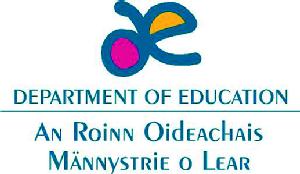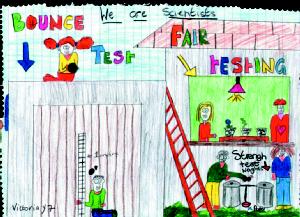| 2002 |

|
YEAR BOOK |
Department of Education, Northern Ireland
|
Developments in science teaching in
Northern Ireland schools
|

The report provided an overview of the current practice in a sample of primary schools across Northern Ireland. It identified a number of significant strengths, the most important of which are: the excitement, enthusiasm and enjoyment of the children when they are offered good quality experiences in science and technology, and the impact that this has on their ability to think and reason for themselves. Since the introduction of the Northern Ireland Curriculum in 1989, the science and technology area of study has increasingly become one of the main elements in the primary curriculum. Over the years, the vast majority of primary teachers in Northern Ireland have worked hard to establish a meaningful and relevant science curriculum for all pupils, and with a large measure of success. The report identified a number of priorities for action; these priorities include:
� �more specific guidance for the progressive development and implementation of Attainment Target 1 (Investigating and Making)
�� improved planning for the integration of technology in the curriculum
�� more specific guidance for the integration of information and communications technology in science and technology teaching
�� improved planning to meet the needs of children across the full ability range
�� avoiding over-direction of the children and the setting of overly structured written tasks
�� ensuring that children's work is assessed regularly and that the outcomes of assessment are used to inform subsequent teaching and learning
�� development of children's independent writing skills and providing opportunities to express, in their own words, their ideas about scientific and technological observations and findings
�� improving the curricular contacts between primary and post-primary schools in relation to science and technology.

Self-evaluation
The five Education and Library Boards (ELBs) in Northern Ireland, who have the responsibility for the provision of in-service support to schools, have drawn up and disseminated some valuable computer-based materials which are helping science departments in post-primary schools to evaluate the effectiveness of their own practice. These materials, based on the EFQM (European Foundation for Quality Management) Business Excellence Model, are being used effectively to improve teaching and learning in science in an increasing number of schools.
Supply of science teachers in post-primary schools
The supply of well-qualified entrants to the teaching profession in Northern Ireland is a significant strength of the system; however, teacher shortages in the physical sciences and in technology are an increasing concern for schools. Strategies to address the shortfall in the number of undergraduates/post-graduate students undertaking initial teacher education courses in physical sciences and technology in higher education institutions in Northern Ireland are under consideration � a range of strategies including: the promotion of more innovative, stimulating and inspiring teaching of physical science and technology in primary and post-primary schools; developing the statutory curriculum in ways which provide young people with suitable opportunities to develop progressively their knowledge, understanding and skills in science throughout compulsory education; and forging closer links between university departments providing courses in physical science and engineering with their counterparts in teacher education.
Science Year
Science Year, which runs from September 2001 to August 2002 across the UK, is designed to change attitudes to science and technology. Its aim is to wake up people of all ages and backgrounds to the importance of science in society, and make the subject appealing and engaging to a wider audience than ever before. In schools, Science Year underpins work being done to put science-related subjects at the heart of the curriculum, and aims to boost the take-up of science subjects at post-16 level. A 12-month programme of specially created events and activities has been developed by some of the UK's most active and innovative science-related organisations. In Northern Ireland, Science Year funding has been used to promote science through conferences, lectures and a grants scheme for school and community groups. The outcomes of the year are encouraging, and evidence of innovative science investigations and projects is being gathered from a number of sources.
While there is much evidence which highlights the strength of science teaching in Northern Ireland, there are challenges to be met. The need to prepare young people for a world which is increasingly scientific and technological in nature, the need to increase public understanding of science, and the need to have sufficient scientists, technologists and engineers to contribute to economic progress, present challenges for all those involved in science education.
Contact: Department of Education, Northern Ireland,
Rathgael House, 43 Balloo Road, Bangor, Co. Down BT19 7PR;
Tel: 028 9127 9279